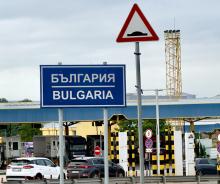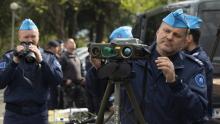All News on Politics in Croatia
Croatian MPs Recognise Soviet-Era Ukrainian Famine as Genocide
A memorial ceremony at a monument to Holodomor victims in Kyiv, November 2021. Photo: EPA-EFE/SERGEY DOLZHENKO.
Croatian MPs unanimously voted on Wednesday to adopt a declaration recognising the Holodomor of 1932-33 as a crime of genocide committed by the Soviet authorities against the Ukrainian people.
Euractiv: Bulgaria enters Schengen in 2 Stages
Bulgaria will in all probability enter Schengen by the end of the year and the admission will be in two stages. In October, border control at the airports will be abolished, and in January 2024 - the ground control as well.
This was reported by the Brussels-based publication Euractiv, citing sources from diplomatic circles in Brussels, the Bulgarian parliament and the government.
In Montenegro, Memories of Pain and Generosity on the Refugee Road
Dejan, then 20, had been nearing the end of his military service in Kosovo, then a southern province of Serbia, when NATO launched air strikes to halt a brutal Serbian counter-insurgency war. At the time, Serbia and Montenegro were all that was left of Yugoslavia, still joined together after the other four republics - Bosnia and Herzegovina, Croatia, Slovenia and Macedonia - had seceded.
Bosnia Data Contradicts Croatian Claim about Migrant, Refugee ‘Readmissions’
According to the Service's figures, 3,433 people have been 'readmitted' since 2017, the year that migrants and refugees mainly from the Middle East, Asia and Africa began crossing Bosnia in any great numbers. That does not include the thousands returned illegally, so-called 'pushbacks' across the border that fly in the face of the internationally-guaranteed right to seek asylum.
Balkan Countries Host ‘Immediate Response’ NATO Exercise
A US soldier gestures to a North Macedonian armoured vehicles near Kumanovo, North Macedonia. Photo: EPA-EFE/GEORGI LICOVSKI
Citizens of several Balkan countries over the weekend and on Monday have had an opportunity to see displays of military equipment being used for the NATO "Immediate Response" military exercise.
EU Border Guards to Target Illegal Migration in Montenegro
Frontex officers check equipment in Skopje, North Macedonia. Photo: EPA-EFE/GEORGI LICOVSKI
Adzic signed an agreement with EU home affairs commissioner Ylva Johansson and justice minister Gunnar Strommer to allow the deployment of the Frontex officers in Montenegro.
According to the agreement, Montenegrin police and Frontex can also organise joint operations.
Montenegro War Victims Legislation Criticised as ‘Discriminatory’
A Montenegrin parliament session in Podgorica. Photo: Parliament of Montenegro.
On Monday, parliament adopted the amendments proposed by the ruling Peace is Our Nation bloc enabling monthly compensation to be paid to family members of civilian war victims who were killed, died or disappeared during armed conflicts on the territory of Montenegro.















